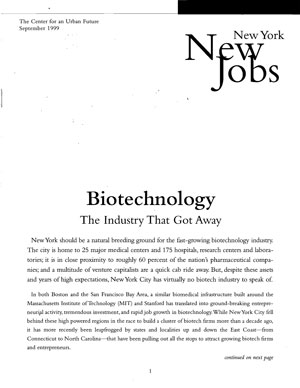The Center for an Urban Future, a Manhattan-based policy institute, today applauded Governor Pataki for proposing a substantial new state investment in New York’s biotechnology industry during his State of the State speech last Wednesday, but questioned why New York City wasn’t more of a focus of the governor’s ambitious plan. The Center urged the Governor to make New York City the centerpiece of any new state investment in biotech when he submits his budget to the Legislature later this month.
In his State of the State address, Governor Pataki proposed funding for three high-technology “Centers of Excellence,” all of which are located upstate--in Buffalo, Rochester and Albany. The Governor barely mentioned New York City in his high-tech proposal, only saying his plan may eventually be expanded to other areas of the state, including the city.
“The biotech industry is capable of tremendous growth over the next few decades and the Governor’s new investment package will help New York compete with other states that are moving ahead in this field,” said Jonathan Bowles, research director of the Center for an Urban Future. “However, any plan that doesn’t tap into New York City’s huge potential for biotech growth would be foolish and shortsighted.”
Bowles said that New York City institutions—including Columbia University, Yeshiva University, Mt. Sinai School of Medicine, NYU, Memorial Sloan Kettering, Rockefeller University and the New York Psychiatric Institute—are the intellectual hub of the state’s biomedical and biotech industries. He said that investing in the city’s biotech and biomedical complex will have immediate spinoff benefits for the development of drug manufacturing and other biotech firms in the Hudson Valley, Long Island and other parts of the state.
Bowles said that the city has long had the potential to be one of the nation’s leading centers for commercial biotechnology research. It is home to seven medical research institutions that are among the top 100 recipients of National Institutes of Health (NIH) funding–more than any city in the nation other than Boston. Finally, many of the nation’s leading pharmaceutical companies and venture capitalists are located in or near the city.
In other parts of the country, this kind of infrastructure has fostered groundbreaking entrepreneurial activity and rapid job growth in biotechnology. Yet, partly because of years of neglect from city and state officials and a lack of research facilities, the city’s biotech industry has failed to reach its growth potential. As a result, New York has missed out on an opportunity to create hundreds of well-paying jobs and has seen top-flight scientists and faculty leave for greener pastures.
In recent years, dozens of biotech companies that were founded in the city have relocated to New Jersey, Boston, San Diego and other parts of the country. The city’s shortage of built-out lab space is a major reason that so many of these start-ups have fled the city.
Bowles, who authored a report on the city’s biotech industry for the Center in 1999, noted that while the Pataki Administration has allocated millions of dollars to build biotech incubators and research parks in Buffalo, Rochester and Long Island (see list below), the administration has not funded any similar project in New York City.
Currently, New York City has just one biotech incubator—Columbia’sAudubon Biomedical Science and Technology Park, which received $8.1 million in state funding in 1994 and opened in 1995. It has been fully occupied for most of the last several years and, because of the unique lab requirements and zoning needs of biotech firms, start-ups that can’t find space at Audubon have virtually nowhere to go in New York City.
“There would be an immediate jump in the number of biotech companies in the city if another incubator or research park were developed,” said Bowles. “However, these facilities are extremely expensive to develop and, in recent years, every dollar of state funding for facility development has gone to other regions of the state.”
Recent State Investments in Biotechnology
Long Island
-
$16.5 million to construct the Broad Hollow Bioscience Park on the campus of SUNY Farmingdale. (1999)
-
$8 million to expand a manufacturing facility for OSI Pharmaceuticals in Farmingdale. (2000)
-
$4.5 million for construction of a biotech incubator at the North Shore University Hospital in Manhasset. (2000)
-
$1 million to plan the Millennium Technology Center on the campus of SUNY-Stony Brook. (2000)
Buffalo
-
$5 million to establish a Biotechnology Research Center at SUNY Buffalo. (1999)
-
Rochester
-
$7 million for the University of Rochester’s Aab Institute of Biomedical Sciences. ($3 million provided in 1999 and $4 million provided in 2000)
Ithaca
-
$300,000 to support a new science and technology center in Nanobiotechnology at Cornell University. (2000)
-
$1 million to purchase high-tech equipment and fund a study of the potential of creating a “Genomics Corridor” in New York State. (1999)



